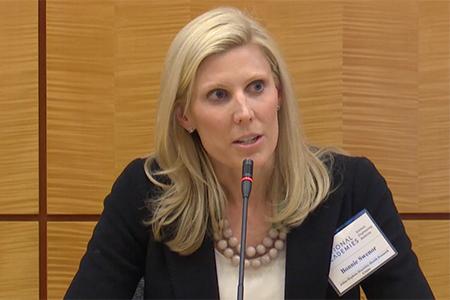Hubstaff Report
/ Released on June 26, 2023
Earlier this month, the National Academies of Sciences, Engineering, and Medicine hosted a five-part conversation series to explore how bias and ableism limit opportunities for people with disabilities to contribute and succeed in the nation’s STEM ecosystem, and how this exclusion impedes scientific progress.
The series, titled “Breaking Down Ability Discrimination and Advancing STEM,” kicked off with a hybrid National Leadership Summit in Washington, DC and online on June 5. Across the five events, panelists from a variety of disciplines and backgrounds explored ways to advance disability accessibility and inclusivity in STEM workplaces and STEM education, as well as the need to eradicate bias and stigma in these environments.
In total, the series had over 1,000 participants.
“The STEM ecosystem has been structured in a way that excludes people with disabilities,” said Bonnie Swenor, founder and director of the Johns Hopkins Center for Disability Health Research and chair of the committee that organized the series of events. “People with disabilities are often assumed not to be among their peers in STEM. It’s time to confront head-on the perception that people with disabilities can’t be successful or don’t belong in STEM.”
People with disabilities are the largest minority group in the United States, estimated to make up about 27 percent of the population, but they make up just 3 percent of the STEM workforce, according to recent data published in the Journal of the American Medical Association by researchers at the Johns Hopkins University Center for Disability and Health Research.
Many people attended the Leadership Summit on June 5, including Karen Marongel, Chief Operating Officer of the National Science Foundation, Marcia McNutt, President of the National Academy of Sciences, Anjali Forber Pratt, Director of the National Institute on Disability, Independent Living, and Rehabilitation, Barbara Snyder, President of the Association of American Universities, and Holden Thorp, Editor-in-Chief of Science magazine. Topics discussed at the event included disability identity, the workplace ecosystem, barriers to career advancement, and access and inclusion practices and policies that support and advance people with disabilities in STEM fields.
“We need an all-in approach to STEM to drive scientific progress and innovation in ways that haven’t been possible before,” Swenor said. “That means we must remove the barriers that keep talent away from STEM education and the STEM workforce, and people with disabilities are no exception. It’s past time to challenge the misconceptions about including people with disabilities in the STEM workforce, not only because it’s the right thing to do, but because it’s good for science.”
This month’s conversation series includes four more conversations.
Three of the events included members of the Johns Hopkins community.
On June 7, Cathy Axe, Executive Director of Student Disability Services, participated in a panel discussion titled, “Beyond Compliance with Laws and Employment Policies and Procedures.” On June 13, Erica Avery, a doctoral student in the Department of Physiology, School of Medicine, participated in a conversation titled, “Programs to Promote Peer Mentorship Among Students with Disabilities,” and discussed Hopkins’ Equal Access in Science and Medicine (EASM) student group. On June 16, Miche Aaron, a doctoral student in the Department of Earth and Planetary Sciences, participated in a discussion titled, “Overcoming Prejudice and Bias.”
More information about the Conversations series, including archived broadcasts of all sessions, is available online .

